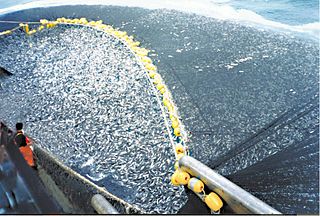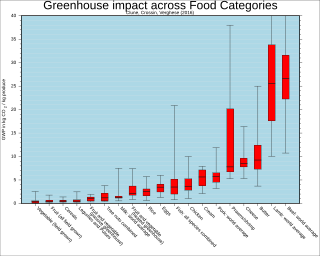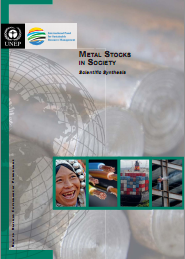
A renewable resource, also known as a flow resource, is a natural resource which will replenish to replace the portion depleted by usage and consumption, either through natural reproduction or other recurring processes in a finite amount of time in a human time scale. When such recovery rate of resources is unlikely to ever exceed a human time scale, these are called perpetual resources. Renewable resources are a part of Earth's natural environment and the largest components of its ecosphere. A positive life-cycle assessment is a key indicator of a resource's sustainability.

A plant-based diet or a plant-rich diet is a diet consisting mostly or entirely of plant-based foods. Plant-based foods are foods derived from plants with no animal-source foods or artificial ingredients. While a plant-based diet avoids or has limited animal products, it is not necessarily vegan. The Academy of Nutrition and Dietetics states that well-planned plant-based diets support health and are appropriate throughout all life stages, including pregnancy, lactation, childhood, and adulthood, as well as for athletes.

Food miles is the distance food is transported from the time of its making until it reaches the consumer. Food miles are one factor used when testing the environmental impact of food, such as the carbon footprint of the food.

Environmental vegetarianism is the practice of vegetarianism when motivated by the desire to create a sustainable diet that avoids the negative environmental impact of meat production. Livestock as a whole is estimated to be responsible for around 18% of global greenhouse gas emissions. As a result, significant reduction in meat consumption has been advocated by, among others, the Intergovernmental Panel on Climate Change in their 2019 special report and as part of the 2017 World Scientists' Warning to Humanity.
Sustainable procurement is a process whereby organizations meet their needs for goods, services, works and utilities in a way that achieves value for money on a life-cycle basis while addressing equity principles for sustainable development, therefore benefiting societies and the environment across time and geographies. Procurement is often conducted via a tendering or competitive bidding process. The process is used to ensure the buyer receives goods, services or works for the best possible price, when aspects such as quality, quantity, time, and location are compared. Procurement is considered sustainable when organizations broadens this framework by meeting their needs for goods, services, works, and utilities in a way that achieves value for money and promotes positive outcomes not only for the organization itself but for the economy, environment, and society. This framework is also known as the triple bottom line, which is a business accounting framework. The concept of TBL is narrowly prescribed, and even John Elkington, who coined the term in the 1990s, now advocates its recall. Indeed, procurement practitioners have drawn attention to the fact that buying from smaller firms, locally, is an important aspect of sustainable procurement in the public sector. Ethics, culture, safety, diversity, inclusion, justice, human rights and the environment are additionally listed as important aspects of SPP.
A low-carbon diet refers to making lifestyle choices related to food consumption to reduce resulting greenhouse gas emissions (GHGe). Choosing a low carbon diet is one facet of developing sustainable diets which increase the long-term sustainability of humanity.
Sustainable diets are defined as "those diets with low environmental impacts that contribute to food and nutritional security and to healthy lives for present and future generations. Sustainable diets are protective and respectful of biodiversity and ecosystems, culturally acceptable, accessible, economically fair and affordable, are nutritionally adequate, safe, and healthy, and optimize natural and human resources." These diets attempt to address undernourishment, nutrient deficiencies and obesity and covers ecological phenomena such as climate change, loss of biodiversity and land degradation.

Sustainability is the capacity to endure in a relatively ongoing way across various domains of life. In the 21st century, it refers generally to the capacity for Earth's biosphere and human civilization to co-exist. It is also defined as the process of people maintaining change in a homeostasis-balanced environment, in which the exploitation of resources, the direction of investments, the orientation of technological development, and institutional change are all in harmony and enhance both current and future potential to meet human needs and aspirations. For many in the field, sustainability is defined through the following interconnected domains or pillars: environmental, economic and social. Sub-domains of sustainable development have been considered also: cultural, technological and political.

The environmental impact of agriculture is the effect that different farming practices have on the ecosystems around them, and how those effects can be traced back to those practices. The environmental impact of agriculture varies widely based on practices employed by farmers and by the scale of practice. Farming communities that try to reduce environmental impacts through modifying their practices will adopt sustainable agriculture practices. The negative impact of agriculture is an old issue that remains a concern even as experts design innovative means to reduce destruction and enhance eco-efficiency. Though some pastoralism is environmentally positive, modern animal agriculture practices tend to be more environmentally destructive than agricultural practices focused on fruits, vegetables and other biomass. The emissions of ammonia from cattle waste continues to raise concerns over environmental pollution.

The International Resource Panel is a scientific panel of experts that aims to help nations use natural resources sustainably without compromising economic growth and human needs. It provides independent scientific assessments and expert advice on a variety of areas, including:
Sustainable products are those products that provide environmental, social and economic benefits while protecting public health and environment over their whole life cycle, from the extraction of raw materials until the final disposal.

The report Metal Stocks in Society: Scientific Synthesis was the first of six scientific assessments on global metals to be published by the International Resource Panel (IRP) of the United Nations Environment Programme. The IRP provides independent scientific assessments and expert advice on a variety of areas, including:
Recycling Rates of Metals: A Status Report was the 2nd of six scientific assessments on global metals to be published by the International Resource Panel (IRP) of the United Nations Environment Programme. The IRP provides independent scientific assessments and expert advice on a variety of areas, including:

The report Decoupling Natural Resource Use and Environmental Impacts from Economic Growth is one of a series of reports researched and published by the International Resource Panel (IRP) of the United Nations Environment Programme. The IRP provides independent scientific assessments and expert advice on a variety of areas, including:
Life cycle thinking is an approach to becoming mindful of how everyday life affects the environment. This approach evaluates how both consuming products and engaging in activities impacts the environment but it not only evaluates them at one single step, but takes a holistic picture of an entire product or activity system. This means when talking about a product and taking a life cycle thinking approach, what is actually being evaluated is the impact of the activity of consuming that product. This is because by consuming a product, a series of associated activities are required to make it happen—the raw material extraction, material processing, transportation, distribution, consumption, reuse/recycling, and disposal must all be considered when evaluating the environmental impact. This is called the life cycle of a product. The overall idea of making a holistic evaluation of a system's effect can be defined as life cycle thinking.
In economic and environmental fields, decoupling refers to an economy that would be able to grow without corresponding increases in environmental pressure. In many economies, increasing production (GDP) currently raises pressure on the environment. An economy that would be able to sustain economic growth while reducing the amount of resources such as water or fossil fuels used and delink environmental deterioration at the same time would be said to be decoupled. Environmental pressure is often measured using emissions of pollutants, and decoupling is often measured by the emission intensity of economic output.
The report Environmental Risks and Challenges of Anthropogenic Metals Flows and Cycles was the third of six scientific assessments on global metals to be published by the International Resource Panel (IRP) of the United Nations Environment Programme. The IRP provides independent scientific assessments and expert advice on a variety of areas, including:

Ashok Khosla is an Indian environmentalist currently based in Delhi. He received his PhD in experimental physics from Harvard University with a doctoral dissertation in the hyperfine structure of hydrogen halide isotopes. He is the co-chair of United Nations Environment Programme’s International Resource Panel (UNEP-IRP) and is internationally known for pioneering and contributing to sustainable development. He is recognized for popularizing the word and concept of "sustainability" in international forums. He was actively involved in various projects that defined the environmental views and activities of institutions such as UNEP, UNESCO, UNU, the U.S. Academy of Sciences, IUCN, and the ICSU/SCOPE. He was also the President of IUCN and Club of Rome. Ashok Khosla is member of the World Future Council.

Bas de Leeuw is a Dutch economist and sustainability expert. He is currently Managing Director of the World Resources Forum.

Sustainable Development Goal 12 is about "responsible consumption and production". It is one of the 17 Sustainable Development Goals established by the United Nations in 2015. The official wording of SDG 12 is "To ensure sustainable consumption and production patterns". SDG 12 is meant to ensure good use of resources, improving energy efficiency, sustainable infrastructure, and providing access to basic services, green and decent jobs and ensuring a better quality of life for all. SDG 12 has 11 targets to be achieved by at least 2030 and progress toward the targets is measured using 13 indicators.












